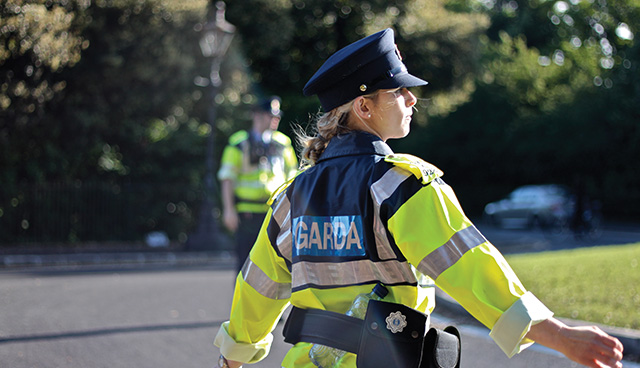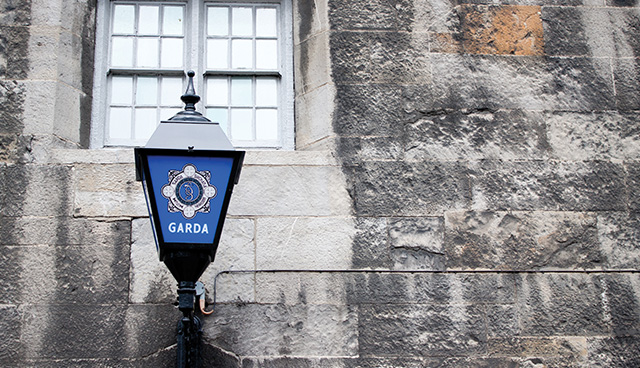Guarding the future of policing


Policing is a contentious issue in many societies. This is particularly true in this State, where a number of controversies have rocked public confidence in the role and effectiveness of An Garda Síochána. eolas reports.
Kathleen O’Toole, chairwoman of the Commission on the Future of Policing in Ireland, makes explicit reference to those controversies in her foreword to the report, The Future of Policing in Ireland, writing: “It is clear that public confidence has been shaken in the wake of tribunals and news stories, yet the majority of people in Ireland continue to support their police and are eager to work in partnership with them to improve safety and enhance the quality of life in their communities.”
Set up in May 2017, the Commission was given the brief by the Government to conduct a thorough examination of policing in the State. The Commission, she writes, did not approach its remit “through a prism of scandal or accusation, but instead in an objective, strategic manner. We had no agenda but to get this right”.
The work has been given an added impetus by predicted demographic changes. It is expected that the population of the State will rise from 4.8 million to about six million in the next 20 years. This will spur large urban growth and, consequently, the need for gardaí to protect new communities and businesses.
The report lays down 10 principles which it believes will underpin policing for the foreseeable future. Those foundation stones include: human rights; internal governance of An Garda Síochána and outside oversight; clearly defined policing duties; a professional service with the right tools to do its job; and a service that adapts, innovates, is cost effective and which is properly structured and well managed to face the challenges of a “modern, dynamic country”.
Stressing that the aim of policing is to protect the human rights of everyone in society and to allow them to live “free from violence, abuse, crime and fear”, the report argues that An Garda Síochána should establish “a human rights strategy, and a human rights unit” which would develop, put into effect and oversee these aspects of its work. In addition, “legislation defining police powers of arrest, search and detention should be codified, with statutory codes of practice” and An Garda Síochána should liaise with the Irish Human Rights and Equality Commission to fulfil its responsibilities in this area.
The report also notes that policing and national security are not the sole responsibility of the police. Much police effort is taken up with “harm prevention”, with individual gardaí helping people with mental health or addiction issues and with children and the elderly. This “broader concept of community safety” needs to be put into a new Policing and Community Safety Act which would include not just An Garda Síochána but also local authorities and other services dealing with health, child and social issues.
While recognising that An Garda Síochána are held to account by the Minister for Justice and Equality, the report argues that there needs to be “an enhanced, regular programme of engagement” between gardaí and the Joint Oireachtas Committee on Justice Equality. This will “improve the effectiveness of this channel”.
Internal governance must also be improved. The Garda Commissioner should have the necessary powers to manage the organisation by being able to appoint a senior leadership team, by being responsible for promotions and assignments and for making financial decisions. In addition, the commissioner should be supported by a statutory board: “Rarely if ever does a career police officer reach the position of chief of police with the full range of knowledge and expertise to run a complex institution of 15,000 people and a €1.65 billion budget. Even in the private sector … it is usual to have a board including non-executive members with diverse backgrounds and experience.”

“We firmly believe that a comprehensive transformation is achievable, and that Ireland can and should have a modern, highly professional police service to be proud of…”
The report states that the public want to see more gardaí on the front line and that this can be achieved by freeing officers from work that does not require police powers. The report also warns of the growing danger of online criminality and argues that “tackling cybercrime must be regarded as a core function of policing, and resourced accordingly, to a far higher level than it is now”. Current garda technology is “outdated and inadequate” and this has had a detrimental effect on services and resources. Consequently, there is a need to undertake “a comprehensive” digital strategy.
A “new district policing model” should also be set up and become the heart of the new policing structure. Garda divisions “should be large enough to be self-sufficient”; the 28 divisions established at present “seem to us to be too many and too small”. The report argues that Garda Headquarters should “set policies, broad strategy, standards and objectives” while those on the front line should have more freedom to decide how those objectives are best met.
Fundamental changes should also be carried out in recruitment and training. Recruits who already have a degree should undertake a shorter training course which focuses on policing. A Director for Learning and Development, with a dedicated budget for training, should be established while An Garda Síochána should recruit from more ethnically, socio-economic and geographically diverse backgrounds. The commission noted that it had visited “lower income urban areas and border areas from which no young people apply to join…” It also suggests that “age diversity should be encouraged” and believes that the maximum age limit of 35 “is outdated and should be scrapped”.
An Garda Síochána should foster a new ethos which interprets gardaí as “a team of professionals working together, not a hierarchy in which foot soldiers wait for instructions from above”. It should also embrace an “innovative and adaptive organisational culture”.
The Commission recognised that the reforms it wanted could not be carried out overnight but that they must be undertaken as quickly as possible and that 2022 was “a realistic target”.
“We firmly believe that a comprehensive transformation is achievable, and that Ireland can and should have a modern, highly professional police service to be proud of, working closely and collaboratively with communities and other agencies to protect the nation and its people from harm.”





